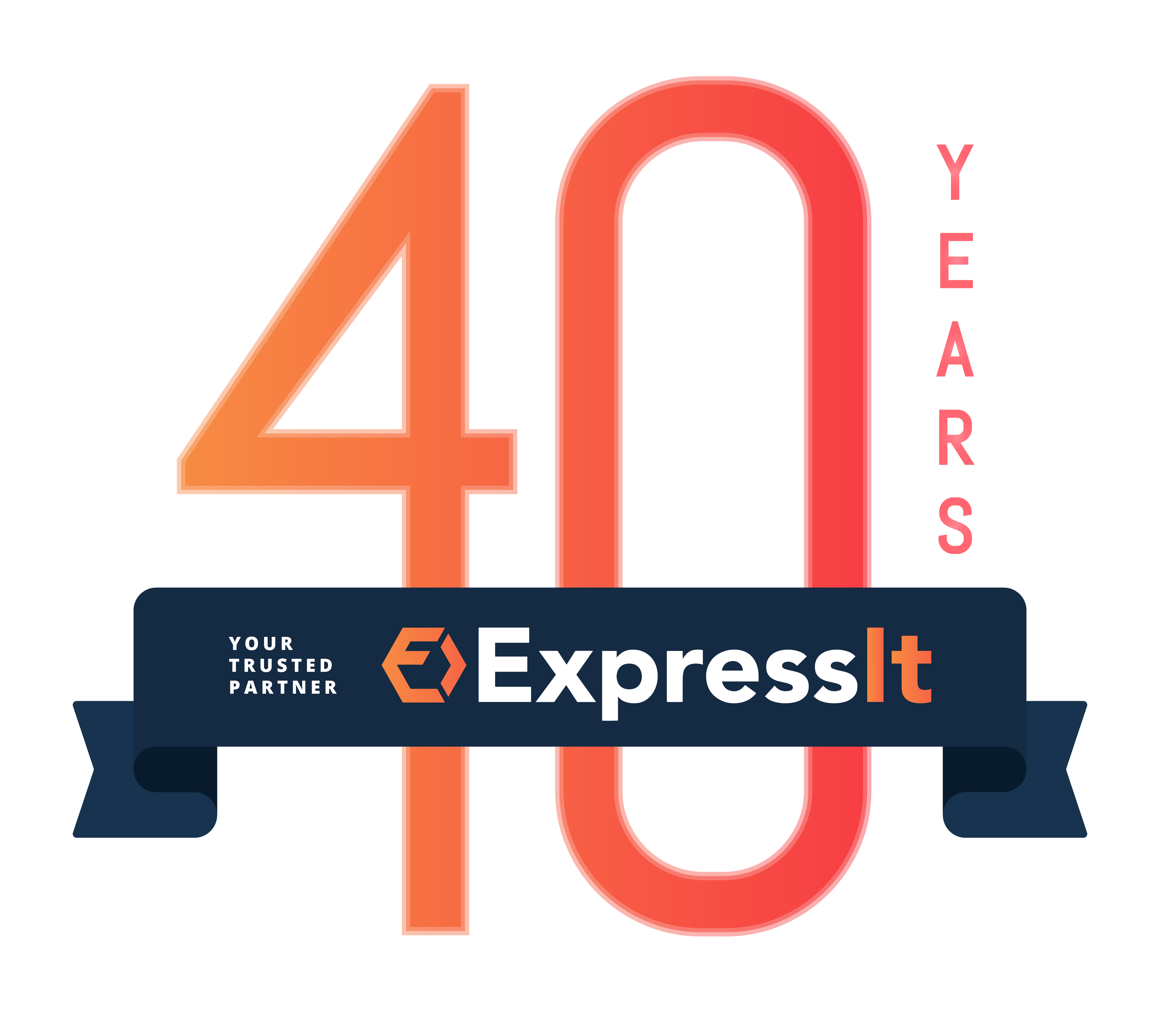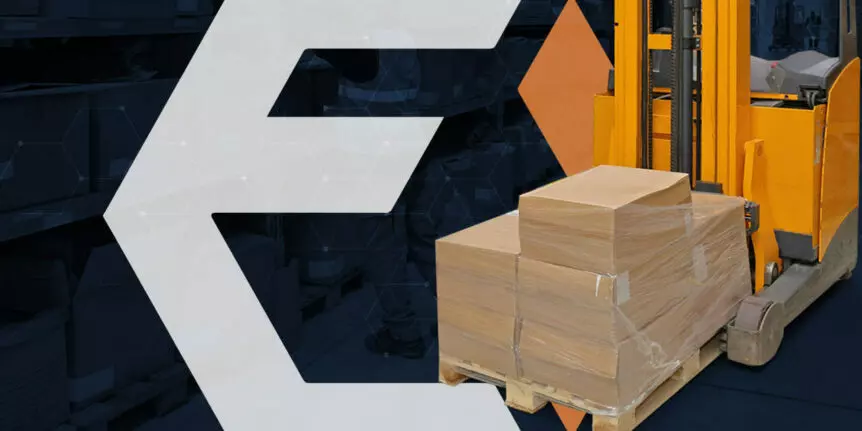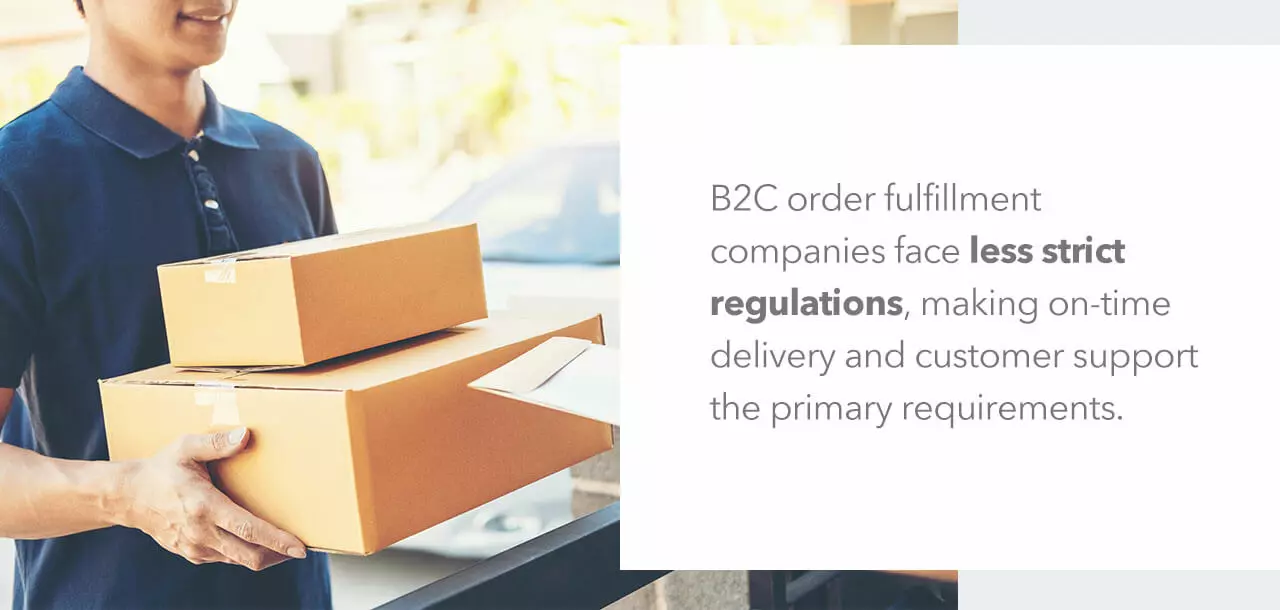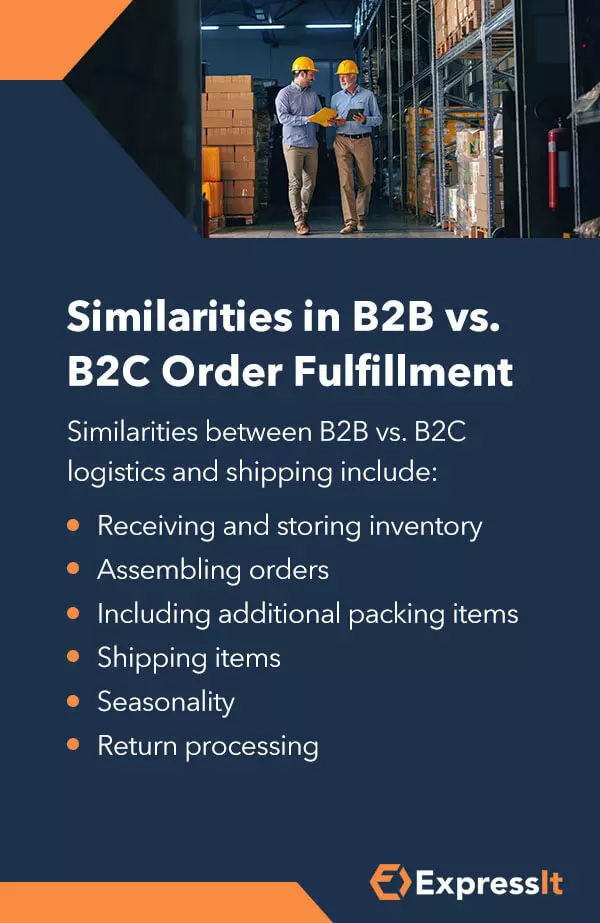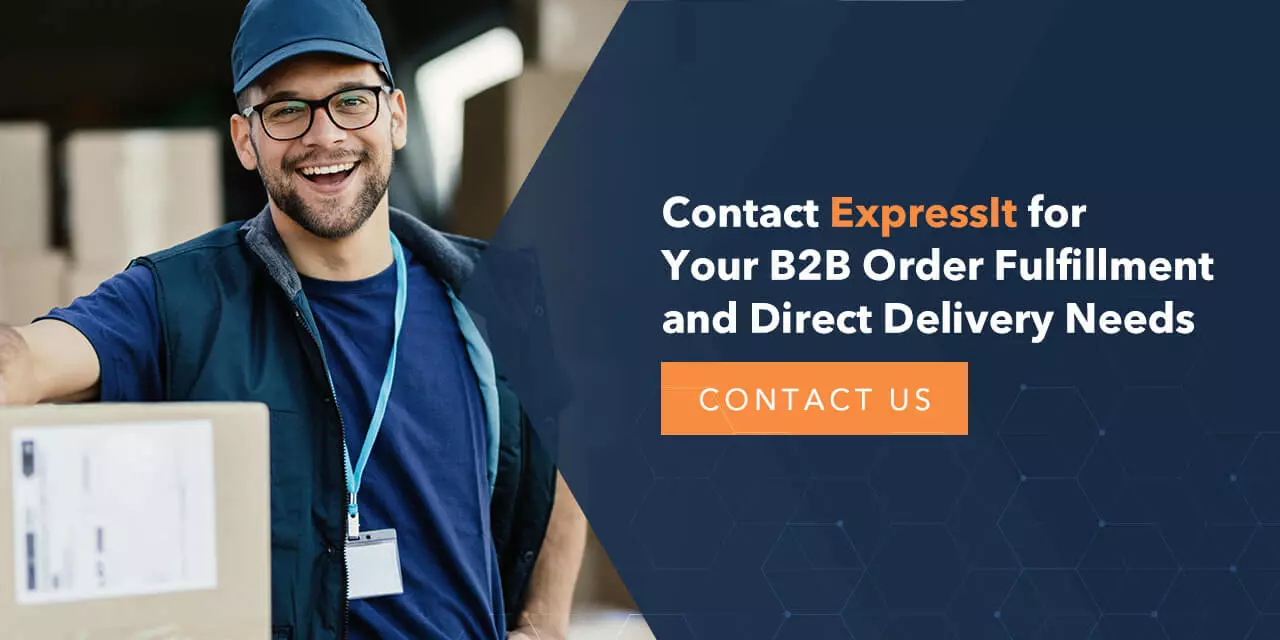Business-to-business (B2B) and business-to-consumer (B2C) order fulfillment are essential to the growth and success of any company. But these processes can seem complex to a new business owner who may only be familiar with suppliers, distributors and support services. While the same fulfillment warehouse might provide both B2B and B2C fulfillment services, the procedures for each type are very different.
Knowing the difference between B2B vs. B2C logistics and shipping will help you understand the importance of fostering business relationships, finding suitable suppliers, overseeing your warehouse and delivering a quality customer experience.
Keeping this in mind, read on to learn the differences between B2B and B2C order fulfillment.
What Is B2B Order Fulfillment?
The B2B order fulfillment process involves the delivery of large orders from business to business.
The most common type of B2B fulfillment is bulk, wholesale shipments, which involve shipping goods to retailers for resale to consumers. The process allows companies to store materials they need for day-to-day operations ahead of time. B2B fulfillment centers aim for efficient, dependable delivery services. Companies also expect services to be augmented for cost-effectiveness and greater efficiency.
B2B order fulfillment centers must follow specific and intricate routing systems in their warehouse operations, which is vital to a company’s ability to get their orders on time. Mismanagement or delays can harm the recipient business’ reputation and bottom line, sometimes leading to losses or penalty fees due to refunds.
Many large businesses merge warehousing and B2B order fulfillment with computer software to share order information and data with suppliers in real-time. Fulfillment centers also must comply with guidelines like product restrictions, SKU codes, invoices and other shipment details.
Many B2B warehouses operate more like distribution centers than traditional logistics companies. A B2B order fulfillment provider can handle the more stressful aspects of wholesale delivery, allowing you to pursue wholesale accounts with companies that can help your business grow and succeed.
What Is B2C Order Fulfillment?
B2C order fulfillment is delivering products directly to customers. The process is what most people think of when they imagine e-commerce fulfillment and it doesn’t face much of an entry barrier since customers buy directly from the website. An example of a B2C transaction would be a consumer purchasing a pair of shoes online.
These order fulfillment services are typically easy to manage as they do not involve shipping large bulk orders. B2C order fulfillment companies face less strict regulations, making on-time delivery and customer support the primary requirements. These companies also must ensure all orders are delivered without damage and provide accurate documentation. Delays or mismanagement in an order fulfillment company can lead to bad reviews for the manufacturer and additional costs due to refunds or returns.
B2C order fulfillment services allow companies to deliver ordered products to consumers much faster, with many providing same-day services. Many of these companies also offer order tracking, customer support, free shipping or value-added services in their warehouses, like packaging, labeling and assembling.
What Does the Order Fulfillment Process Involve?
To understand the similarities and differences between B2B and B2C order fulfillment, it helps to understand the actual process of order fulfillment. Order fulfillment refers to how companies process their sales order to the customer’s specifications. Efficient order fulfillment is key to a business’s reputation, profitability and ability to retain clients.
The process involves assembling the order, shipping it to the customer and fulfilling specific supporting tasks along the way. Many of these steps can take place in one well-organized warehouse, depending on the size of the business. While many small businesses handle order fulfillment in-house through a simple process, large companies typically require a multi-layer distribution center method.
In either case, the primary goal is to get the customer what they ordered as quickly, reliably and inexpensively as possible. The process can be described in the pre-purchase, purchase and post-purchase stages:
- Receiving and storing inventory: Order fulfillment begins with supplying goods. You might supply these on your own, through a third party or through another company warehouse. In any case, receiving inventory involves counting supplies, inspecting and inventorying everything to ensure the proper amount was received and the quality is acceptable. Bar codes on these products are used to receive, store and retrieve goods from storage later.
- Order processing: Order processing management systems will dictate product picking and packing activities for each customer order received.
- Picking: You might use a picking team or warehouse robots to select items from the warehouse according to a packing slip’s instructions. The label will contain specific information, such as product colors, the item’s SKUs, sizes, the number of units and where the product is located in the warehouse.
- Packing: Next, a packing team will select materials to pack items according to the lowest practical dimensional weight. This will speed transport and can potentially lower shipment costs. Items often include return shipping materials and labels if the customer wishes to return or exchange their items.
- Shipping: The order is then sent through a transportation channel to be shipped directly to the customer or to a retail store for customers to shop in person.
- Delivery: At this stage, shipping routes can include more than one carrier. For instance, FedEx might first pick up a package at a fulfillment center to be delivered via USPS to a customer’s home.
- Returns processing: Lastly, returns processing begins by shipping materials and a return label with the original customer’s orders. Fulfillment services will execute this process carefully to ensure they can appropriately restock the item if the customer returns it for an exchange or refund.
Essentially, without sales, there is no business, and without order fulfillment, there are no sales. Whether you’re B2B or B2C, the sale isn’t complete until your sold item is received by the customer. Order fulfillment is, therefore, at the heart of every business.
Similarities in B2B vs. B2C Order Fulfillment
There are a few similarities between B2B vs. B2C shipping. Whether a business uses a B2B or B2C fulfillment process, the goal is to deliver orders efficiently and damage-free. Many companies also work toward finding the most cost-effective or sustainable way to ship items to customers or companies.
A professional order fulfillment company must follow the pre-purchase, purchase and post-purchase stages. That way, a business can uphold its reputation, make a profit and retain its clients. Essentially, both types of order fulfillment work toward the company’s growth and success in selling its goods.
Similarities between B2B vs. B2C logistics and shipping include:
- Receiving and storing inventory: B2B and B2C order fulfillment might follow a similar pre-purchase stage of supplying merchandise. While an e-commerce site might make its products, some outsource specific items to fulfill inventory. They might also stock items similarly to B2B companies in a warehouse or brick-and-mortar shop.
- Assembling orders: Both types of order fulfillment companies will assemble and package items similarly, though they may undergo a different process depending on the sizes of the goods. That’s why B2B shipping is generally associated with bulk orders and fitting items into more oversized packaging for cost-effectiveness.
- Including additional packing items: B2B and B2C order fulfillment processes include specific information for each shipped product. These usually include SKU codes, invoices and other essential shipment details.
- Shipping items: Both order fulfillment services involve shipping goods and services to customers or retail stores. The main priority is delivering these items damage-free, in practically sized packaging and at the lowest price possible.
- Seasonality: While both types of order fulfillment differ in shipment sizes, they’ll typically see more sales and shipments depending on the season. For instance, the holidays can bring changes in demand and prices and, therefore, more frequent bulk shipments in a similar fashion to B2B companies.
- Return processing: B2B and B2C order fulfillment will include return processing. They’ll typically conduct quality control checks for items that may have been returned for a refund. Return products can then be restocked, returned to a vendor credit or sent to a recycling center depending on findings from the quality assurance check.
A single company can operate in both B2B and B2C segments to create a diverse customer base, with each model creating value. Both models can also have online and offline sales and buyer and seller entities.
Ultimately, business vs. consumer shipping involves packaging and shipping items while fulfilling specific supporting tasks. Depending on the business’s size, these steps will take place in a warehouse or a smaller space.
Differences in B2B vs. B2C Order Fulfillment
There are several differences between B2B and B2C order fulfillment regarding the three stages. These include:
Pre-Purchase
The pre-purchase stage of the B2C and B2B order fulfillment process is very different in terms of revenue, product prices and customer support:
- Revenue per customer: Typically, B2B shipments involve large-scale orders of raw goods, while B2C fulfillment deals with small products like clothing or kitchen appliances. As a result, many B2B contracts might measure up to the millions and last a long time compared to a pair of shoes, which might be the only time a customer purchases from the company.
- Product price: Additionally, the B2B order fulfillment process provides costs based on the needs of the recipient business. That means prices between the companies are based on factors like order size, payment terms, recurring orders and the duration of the working relationship. In contrast, B2C transactions occur based on set prices and the same amount for all customers.
- Sales assistance: B2B contracts involve ongoing, long-term support that changes depending on the stage of the process. At the same time, a B2C customer might only require a small amount of sales assistance. They may call about repairs for a phone, for instance, or ask about the warranty for a specific device.
Purchase
The purchase stage reveals many differences in B2B vs. B2C shipping and logistics, from buying decisions to purchase processes, order sizes and more:
- Buying decision: Businesses will conduct a lot of research before agreeing to a B2B contract, usually keeping personal emotions out of the process. In contrast, a B2C company requires less preparation and research and might use their feelings or preferences to make a buying decision.
- Buying process: B2B order fulfillment process involves negotiating with several suppliers depending on their financial needs and decisions. For instance, a restaurant must compare ingredient prices from various sources to find a reliable, cost-effective supplier. In contrast, B2C purchases allow customers to choose which restaurant they want to buy food from.
- Order size: B2B shipments are typically wholesale items ordered numerous times throughout the year, depending on their specific requirements and needs. In contrast, B2C purchases involve lighter deliveries for a single transaction.
- Payments: B2B payments involve procuring materials on credit. For example, when a recipient company orders raw wood from a supplier, they’ll get an invoice with their ordered items detailing how much they owe and other essential conditions of that transaction. A B2C transaction is more straightforward. It allows customers to order a wooden table from an e-commerce site, paying upon delivery.
- Types of warehouse: B2B order fulfillment is typically conducted in a large warehouse since it deals with storing and shipping bulk orders. In contrast, B2B companies might only ship items a few times a month, requiring much smaller storage and order fulfillment space.
Post-Purchase
The key differences between B2B and B2C order fulfillment in terms of couriers and shipping methods, customer relationships and return processes include:
- Shipping methods: Business vs. consumer shipping processes also differ since B2B transactions involve bulk wholesale shipments. B2B shipments can take an extended time to reach the final destination when loaded onto specialized ships or trucks. Trucks with large freezers to preserve food items are an excellent example. In contrast, B2C logistics provide lower costs or sometimes free shipping, with items often arriving within a few days of placing an order.
- Customer relationships: B2B relationships, including contractors and suppliers, are essential for their fulfillment, while B2C services primarily target customer support and satisfaction. B2B contracts involve recurring shipments and close partnerships, which are critical for both parties. In contrast, a B2C consumer can purchase their desired product from their preferred vendor.
- Return processing: B2B order fulfillments deal with bulk order sizes, so their contracts outline the processes and requirements to oversee returns or losses. They may need external insurance companies to reduce the risk for each company. In contrast, B2C transactions outline the market’s standard return and refund policies.
- Couriers: Many B2C orders ship via postal delivery, while most B2B orders ship with LTL or less than truckload freight. However, B2B shipments can benefit from the attention of courier delivery. For instance, many B2B orders use couriers as a final mile step to deliver sensitive items like lab work.
Contact ExpressIt for Your B2B Order Fulfillment and Direct Delivery Needs
Whether you’re B2B or B2C, getting your orders fulfilled in a timely, cost-effective way is essential to the growth of your business. When you partner with ExpressIt for your B2B order fulfillment and deliveries, we’ll help you meet each of your customer’s needs, as we understand that one size does not fit all.
We specialize in same-day delivery and trucking services, offering innovative solutions to our clients throughout the Northeast. When you partner with us, we’ll help you with any logistic issues you may be experiencing, saving you stress and helping your bottom line.
To learn more about our process, contact us today.
